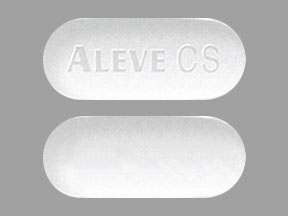Aleve-D Sinus & Cold Side Effects
Generic name: naproxen / pseudoephedrine
Note: This document provides detailed information about Aleve-D Sinus & Cold Side Effects associated with naproxen / pseudoephedrine. Some dosage forms listed on this page may not apply specifically to the brand name Aleve-D Sinus & Cold.
Applies to naproxen / pseudoephedrine: oral tablet extended release.
Important warnings
This medicine can cause some serious health issues
Naproxen can increase your risk of fatal heart attack or stroke. Do not use this medicine just before or after heart bypass surgery (coronary artery bypass graft, or CABG). Naproxen may also cause stomach or intestinal bleeding, which can be fatal.
Get emergency medical help if you have signs of an allergic reaction (hives, difficult breathing, feeling light-headed, swelling in your face or throat) or a severe skin reaction (fever, sore throat, burning in your eyes, skin pain, red or purple skin rash that spreads and causes blistering and peeling).
Get emergency medical help if you have signs of a heart attack or stroke: chest pain spreading to your jaw or shoulder, sudden numbness or weakness on one side of the body, slurred speech, leg swelling, feeling short of breath.
Stop using this medicine and call your doctor at once if you have:
-
severe dizziness or nervousness, trouble sleeping;
-
swelling, rapid weight gain;
-
new or worsening stomach pain; or
-
signs of stomach bleeding--bloody or tarry stools, coughing up blood or vomit that looks like coffee grounds.
Common side effects may include:
-
dizziness;
-
sleep problems (insomnia); or
-
feeling nervous or excited.
This is not a complete list of side effects and others may occur. Call your doctor for medical advice about side effects.
See also:
For healthcare professionals
Applies to naproxen/pseudoephedrine: oral tablet extended release.
General adverse events
The manufacturer has not provided adverse event information.[Ref]
References
1. (2022) "Product Information. Aleve-D Sinus and Cold (naproxen-pseudoephedrine)." Bayer Pharmaceutical Inc
More about Aleve-D Sinus & Cold (naproxen / pseudoephedrine)
- Check interactions
- Compare alternatives
- Reviews (3)
- Drug images
- Dosage information
- During pregnancy
- Drug class: upper respiratory combinations
Patient resources
Other brands
Other formulations
Related treatment guides
Further information
Aleve-D Sinus & Cold side effects can vary depending on the individual. Always consult your healthcare provider to ensure the information displayed on this page applies to your personal circumstances.
Note: Medication side effects may be underreported. If you are experiencing side effects that are not listed, submit a report to the FDA by following this guide.

